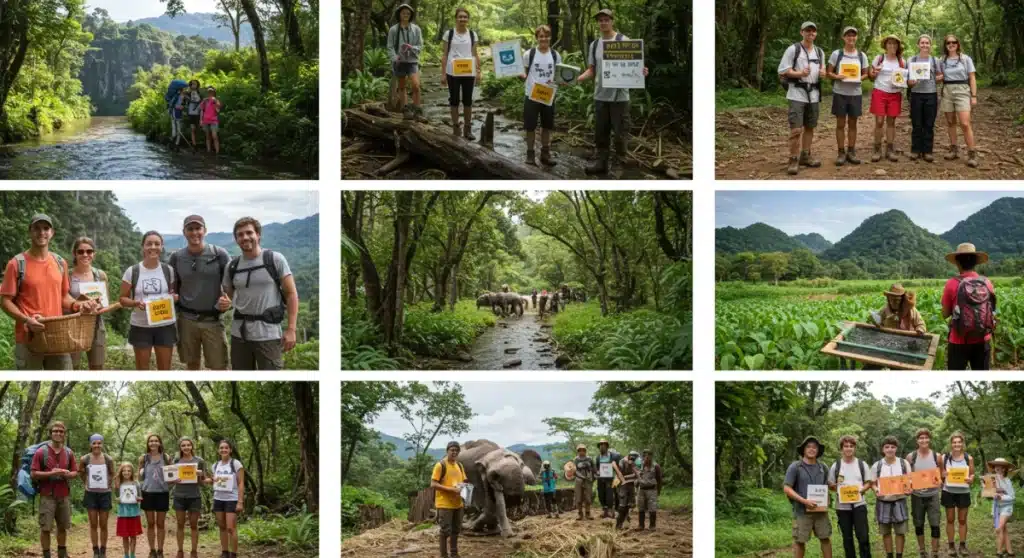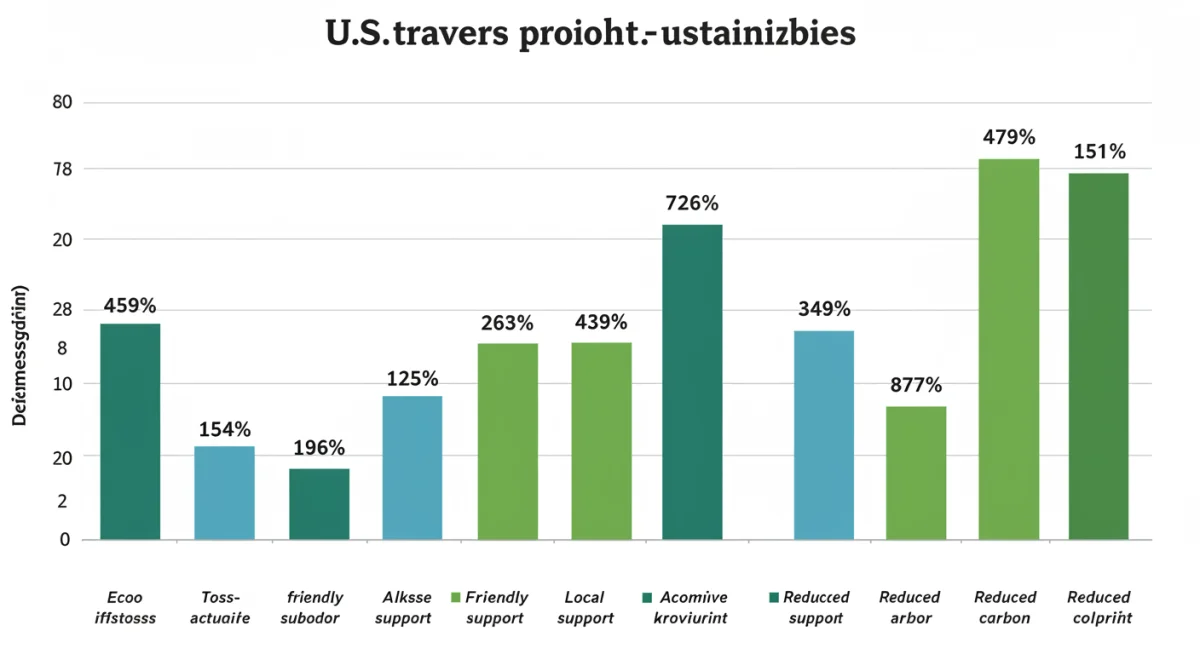Market Insights: Sustainable Travel Trends for 2025 U.S. Travelers

Market Insights: The Rise of Sustainable Travel Preferences Among 2025 U.S. Travelers indicates a pivotal shift towards eco-conscious and responsible tourism, profoundly influencing industry strategies and consumer choices.
Recent market analyses confirm a significant surge in Market Insights: The Rise of Sustainable Travel Preferences Among 2025 U.S. Travelers, signaling a transformative era for the tourism sector. As of late 2024, data indicates that American tourists are increasingly prioritizing environmentally friendly practices and socially responsible operations when planning their trips, according to new reports from leading travel analytics firms.
Understanding the Shift in U.S. Traveler Priorities
The landscape of U.S. travel is undergoing a profound transformation, driven by a growing awareness of environmental and social impacts. Travelers are no longer just seeking leisure; they are actively searching for experiences that align with their values, demanding transparency and accountability from travel providers.
Key Drivers of Sustainable Choices
Several factors are contributing to this accelerated shift. Younger generations, particularly Gen Z and Millennials, are leading the charge, integrating their eco-conscious lifestyles into their travel decisions. Social media platforms also play a crucial role, amplifying discussions around climate change and responsible tourism, influencing a broader demographic.
- Increased environmental awareness among consumers.
- Growing desire for authentic, local experiences.
- Influence of younger demographics on family travel decisions.
- Media coverage highlighting climate change and over-tourism.
This evolving mindset is forcing the travel industry to adapt swiftly. Airlines, hotels, and tour operators are now under pressure to not only offer sustainable options but also to communicate their efforts effectively to a discerning public, as highlighted by a recent survey from the Sustainable Travel Institute.
The Economic Impact of Eco-Conscious Decisions
The rising tide of sustainable travel preferences among U.S. travelers is not merely a social trend; it carries significant economic implications for the global tourism industry. Businesses that fail to adapt risk losing market share, while those that embrace sustainability are poised for substantial growth and enhanced brand loyalty.
Investment in green technologies and responsible supply chains is becoming a competitive advantage. This includes everything from renewable energy sources for accommodations to supporting local economies through ethical sourcing.
New Market Opportunities
New segments are emerging, such as eco-lodges, carbon-offsetting travel packages, and community-based tourism initiatives. These offerings cater directly to the demands of the environmentally conscious traveler, often commanding premium prices due to their perceived value and positive impact.
- Growth in eco-tourism and nature-based travel.
- Increased demand for certified sustainable accommodations.
- Development of transparent carbon offsetting programs.
- Expansion of community-based tourism models.
According to a report published by Green Travel Analytics last week, companies that have demonstrably integrated sustainable practices have seen an average increase of 15% in bookings over the past year, underscoring the financial benefits of aligning with consumer values.
Preferred Sustainable Travel Practices for 2025
As 2025 approaches, U.S. travelers are articulating clear preferences for specific sustainable practices. These go beyond mere rhetoric, translating into concrete choices that influence booking decisions and travel itineraries. Understanding these preferences is vital for industry stakeholders.
Travelers are actively seeking out destinations and providers that minimize environmental footprints, support local communities, and promote cultural preservation. This includes a preference for public transport or electric vehicle rentals, and a strong emphasis on reducing waste during their trips.
Accommodation Choices
Eco-certified hotels and lodges are gaining significant traction. Travelers are looking for properties that use renewable energy, conserve water, manage waste effectively, and source local produce. The availability of such options often dictates where they choose to stay.
Furthermore, there’s a growing interest in accommodations that offer immersive experiences, such as farm stays or stays in indigenous communities, providing a deeper connection to the local culture and environment. This move away from mass tourism is a defining characteristic of the new sustainable traveler.
Challenges and Opportunities for the Travel Industry
The rapid shift in consumer preferences presents both significant challenges and unparalleled opportunities for the travel industry. Adapting to these new demands requires strategic investment, innovative thinking, and a genuine commitment to sustainability.
One primary challenge is the ‘greenwashing’ phenomenon, where companies falsely advertise sustainable practices. Travelers are becoming increasingly adept at identifying these misleading claims, making genuine transparency paramount. Building trust through credible certifications and verifiable actions is more important than ever.

Innovating for a Sustainable Future
Opportunities abound for companies willing to innovate. This includes developing new sustainable products and services, investing in renewable energy infrastructure, and training staff in eco-friendly practices. Collaboration with local communities and conservation organizations can also enhance offerings and build goodwill.
- Developing robust sustainability reporting and certification.
- Investing in green infrastructure and renewable energy.
- Educating consumers on responsible travel choices.
- Forming partnerships with local communities and NGOs.
As reported by the Global Tourism Council last month, companies that proactively integrate sustainability into their core business model are not only attracting more customers but also seeing improved employee retention and a stronger brand image.
Technological Advancements Supporting Sustainable Travel
Technology is playing a pivotal role in facilitating and enhancing sustainable travel. From booking platforms that highlight eco-friendly options to apps that help travelers minimize their carbon footprint, innovation is driving the movement forward. These tools empower travelers to make more informed and responsible choices.
Artificial intelligence and data analytics are being employed to optimize travel routes, reduce fuel consumption, and manage resources more efficiently within the hospitality sector. Blockchain technology is also being explored for transparent supply chains and carbon credit tracking, as noted by a recent tech conference on travel innovation.
Digital Platforms and Eco-Conscious Bookings
Online travel agencies (OTAs) are increasingly integrating sustainability filters, allowing users to search specifically for eco-certified hotels, low-emission flights, and responsible tour operators. This makes it easier for travelers to identify and book options that align with their values.
Furthermore, mobile applications are emerging that provide real-time information on local sustainable businesses, public transportation options, and even tips for reducing waste while traveling. These digital tools are crucial in bridging the gap between intention and action for sustainable travelers.
- Booking platforms featuring sustainability filters.
- Apps for carbon footprint tracking and reduction.
- AI-driven route optimization for eco-friendly travel.
- Blockchain for supply chain transparency in tourism.
These technological advancements are not only simplifying the process of sustainable travel but also creating a more interconnected and informed ecosystem for eco-conscious consumers and providers alike.
Government and Industry Initiatives Driving Change
Government bodies and industry associations are increasingly recognizing the importance of sustainable tourism and are implementing policies and initiatives to support its growth. These efforts range from regulatory frameworks to funding programs, creating a more conducive environment for responsible travel practices.
In the U.S., several states have launched initiatives to promote eco-tourism within national parks and protected areas, encouraging visitors to engage responsibly with natural environments. These programs often involve partnerships with local communities and environmental organizations to ensure long-term sustainability.
Policy and Funding for Green Tourism
International bodies and national governments are allocating funds for research into sustainable tourism models, infrastructure development for green transportation, and educational campaigns to raise awareness among both travelers and industry professionals. This top-down support is critical for widespread adoption.
The U.S. Department of Commerce recently announced new grants aimed at developing sustainable tourism infrastructure in rural areas, reflecting a commitment to fostering responsible growth across the country. These grants are expected to stimulate local economies while preserving natural resources.
- Government grants for sustainable tourism infrastructure.
- Regulatory frameworks promoting eco-friendly operations.
- International collaborations on sustainable travel standards.
- Public awareness campaigns for responsible tourism.
These concerted efforts by both public and private sectors are essential in accelerating the transition towards a more sustainable and resilient travel industry, shaping the choices available to U.S. travelers in 2025 and beyond.
| Key Aspect | Brief Description |
|---|---|
| Traveler Demand | U.S. travelers increasingly prioritize eco-friendly and socially responsible options for their 2025 trips. |
| Economic Shift | Businesses embracing sustainability are seeing growth, while others risk losing market share. |
| Technological Role | New digital tools and AI are simplifying sustainable booking and reducing environmental impact. |
| Industry Adaptation | Travel providers and governments are responding with new policies, investments, and green initiatives. |
Frequently Asked Questions About Sustainable Travel
For 2025 U.S. travelers, sustainable travel means choosing options that minimize environmental impact, support local economies, and respect cultural heritage. This includes selecting eco-certified accommodations and engaging in responsible tourism activities.
Travelers can identify genuinely sustainable options by looking for credible certifications from recognized organizations, checking for transparent reporting on environmental and social practices, and researching reviews that highlight responsible operations.
While some sustainable options may initially appear pricier due to investments in green infrastructure, many offer long-term value through unique experiences and positive impact. The market is also seeing a rise in affordable eco-friendly choices.
Travel companies are crucial in promoting sustainable travel by offering eco-friendly packages, investing in sustainable practices, providing transparent information, and educating travelers on responsible choices. Their initiatives directly influence consumer behavior.
Sustainable travel preferences significantly benefit local communities by encouraging support for local businesses, preserving cultural traditions, and ensuring that tourism revenues directly contribute to the well-being and development of the residents.
Looking Ahead: The Evolving Landscape of Sustainable Travel
The sustained rise in sustainable travel preferences among 2025 U.S. travelers indicates a long-term shift, not a fleeting trend. Industry stakeholders, from small local businesses to multinational corporations, must continue to innovate and adapt. We anticipate further integration of sustainability into core business models, driven by both consumer demand and increasing regulatory pressures. Watch for enhanced transparency in carbon reporting, more robust eco-certification programs, and continued diversification of sustainable travel offerings as the industry navigates this pivotal transformation in the coming years.